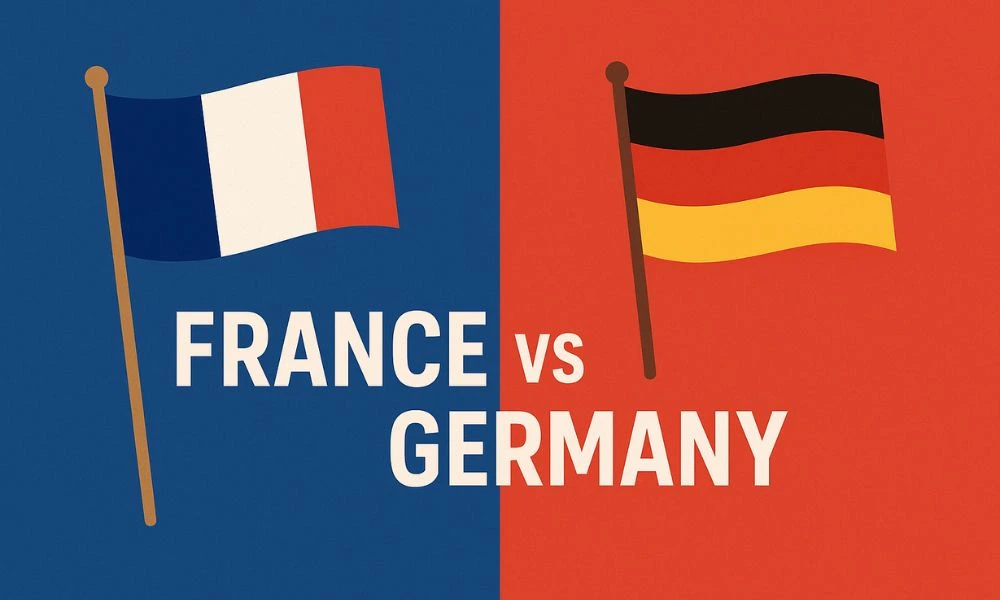Table of Contents
So, you’re staring at two acceptance letters. One of them is from a university in France, the other is in Germany. Congrats! But now comes the tough part: choosing which uni will be the best for you. France and Germany aren’t just European neighbors. They are two of the most popular study-abroad hotspots for international students. And it’s not just about pretty skylines or low tuition fees.
It’s about what kind of lifestyle you want, how much you’re willing to spend, how you learn best, and what kind of job market you’re stepping into after graduation. This guide will walk you through every angle, education, costs, lifestyle, visa pathways, and beyond. Let’s break it down. France vs Germany, where should you plant your student roots?
Why Do Students Choose France or Germany for Higher Education?
Picking between France and Germany is like choosing between croissants and pretzels. Both of them have different vibes. Same delicious value. These two countries consistently top the list for international students. And not just because they are in the middle of Europe. It’s deeper than that. They offer something most English-speaking study destinations don’t. Which is amazing education without soul-crushing tuition fees. And yep, the numbers back up.
- According to Campus France, over 400,000 international students were enrolled in French institutions as of 2024.
- Germany? Even higher. Around 458,000 international students chose to study there last year, based on DAAD stats.
But why are students so hooked on these two? Following are the various reasons why France is more popular:
- Cities like Paris, Lyon, and Bordeaux offer a cool mix of culture and academics. Basically, here you are learning and living at the same time.
- And the unis? They’re top-tier. Places like Sciences Po, HEC Paris, and École Polytechnique are seriously respected around the world.
- Now, about the money, tuition isn’t free. But it is super affordable compared to the UK or US. Most public universities charge somewhere between €170 and €650 a year, even if you’re from outside the EU. Not bad, right?
- Plus, let’s be honest, you’re in France. Art, fashion, food, history… it’s one of the most visited countries in the world for a reason. Studying here just makes the whole experience extra special.
Now here are some of the reasons that makes Germany stand out from the crowd:
- Germany doesn’t charge tuition fees at most public universities. Yeah, even if you’re an international student. It’s true in 15 out of 16 states. You just pay a small semester fee, and that’s it.
- But that’s not all. Germany also has tons of English-taught programs, especially in technical areas like engineering, data science, and AI. So, if you’re not fluent in German, you’re still good to go.
- And if you’re thinking about your future, this might help. Germany has one of the best graduate employment rates in Europe. There’s a big demand for skilled workers here.
- Some of the top unis like TU Munich, Heidelberg, and LMU Munich are ranked in the world’s top 100 by QS. So yeah, the education is legit.
What Are the Major Differences in Education Systems Between France and Germany?
France and Germany might seem similar at first glance. Both offer affordable, government-funded universities. And have a huge number of international students. But once you dig into the academic details, the contrasts start showing up fast. From how courses are structured to how students are taught, the vibe is totally different.
One leans on structure and formality, the other on flexibility and research. It’s less about memorizing and more about applying what you know. So if you’re torn between the two, this deep dive might just help you figure out which country aligns better with your learning style, career goals, and expectations. Let’s break it down properly:
| Aspect | France | Germany |
| Degree Structure | LMD Model: Licence (3 yrs), Master (2 yrs), Doctorat (3–6 yrs) Aligned with the Bologna Process | Bachelor’s, Master’s, PhD (Promotion) Also includes Fachhochschulen & Technische Unis |
| Institution Types | Centralized system Universities, Grandes Écoles, and specialized schools ~3,500 higher education institutions | Decentralized system Public and private institutions ~400 universities across 16 states |
| Flexibility | Less flexible Government-controlled curriculum More uniform academic expectations | More flexibility Universities can design unique programs Greater diversity in learning styles |
| Course Duration | Bachelor’s: 3 years Master’s: 2 years PhD: 3–6 years | Same as France But some Master’s programs offer extended research modules |
| Teaching Style | Lecture-based, structured Heavy focus on theory and rote learning Minimal classroom interaction | Seminar-style, open discussion Research-driven, independent learning encouraged More student participation |
| Grading & Exams | Strict grading (14/20 is excellent) High academic pressure Less forgiving exam policies | Slightly more lenient grading Allows exam retakes Mixed assessment: written, oral, and project-based |
| Academic Pressure | Higher—especially in Grandes Écoles Entrance exams & prep classes required | Moderate pressure More breathing room for resits & project work |
| Student Preference Stats | ~56% of students pursue university degrees | Over 70% of students enroll in public universities |
| Best Fit For | Students who prefer structured academics, formality, and traditional formats | Students who enjoy self-driven learning, open discussion, and practical research |
Which Country Has More Affordable Tuition Fees and Living Costs?
Studying abroad is expensive, and not just because of tuition. Once you include rent, utilities, food and transport, you will not realize things add up. You will start to see how important budgeting really is. So, if you’re stuck between France and Germany, wondering which country hits your bank account the hardest, you’re not alone. Cost of living is one of the top 3 concerns international students have when choosing a study destination.
Both countries have their advantages. Germany is known for tuition-free education. While France offers a more culturally immersive experience with some financial aid options. But what’s the real cost of living and studying in each place? Let’s line them up and see where your euro goes further:
| Category | France | Germany |
| Tuition Fees | Public universities charge: • €170–€601/year (Bachelor’s) • €243–€1,000/year (Master’s) Specialized programs may cost more. Non-EU students may pay slightly higher, depending on reforms. | Public universities charge €0 tuition for most Bachelor’s and some Master’s programs. Only pay semester contribution fee (~€250–€350), which includes public transport. |
| Scholarships | • Eiffel Excellence Scholarship • Campus Bourses • Regional aid for accommodation, travel, and food Over 25% of international students receive financial aid | • DAAD, Erasmus+, uni-specific grants • Focus on STEM & research • Often covers tuition + living costs Heavily supports Master’s students in tech/engineering |
| Average Rent (Monthly) | • Paris: €900–€1,200 • Lyon/Montpellier/Lille: €400–€650 | • Berlin: €450–€700 • Leipzig/Dresden: €300–€500 |
| Utilities & Groceries (Monthly) | €250–€350 depending on lifestyle | €200–€300 average |
| Transport | €30–€50/month (student pass in most cities) | Often included in semester fee; otherwise, €30–€50/month |
| Meal Costs | Café coffee: €2.50–€3.50 Budget meal out: €15–€20 | Coffee: €2–€3 Budget meal out: €10–€15 |
| Hidden Expenses | • Health insurance: ~€30/month for non-EU students • Admin delays & translation help often needed • Parisian nightlife = pricey | • Health insurance: ~€110/month • Textbooks usually not required • Affordable dining, groceries, and entertainment |
| Grocery Tips | Markets & Monoprix popular, but prices can swing Eating out often is pricey | Aldi & Lidl are student favorites Weekly shopping: ~€30–€40 |
| Overall Affordability | Better in smaller cities Paris can burn through savings quickly | More affordable overall, especially outside major hubs Fewer surprise costs |
| Best For… | Students seeking cultural exposure + structured learning in iconic cities | Students on a tight budget who prefer flexible learning and lower costs |
What Are the Top Cities to Study in France and Germany?
Let’s be real, where you live shapes how you experience university. It’s not just about the campus or the course. It’s the tiny café where you revise between lectures, the thrift markets you browse on weekends, and the parks where your group study turns into a chill hangout. In countries like France and Germany, your choice of city can change everything.
And here’s the thing, both countries welcome hundreds of thousands of international students every year. But not all of them head straight to Paris or Berlin. Why? Because smaller, lesser-known cities often offer better affordability and calmer lifestyles. So here’s a side-by-side breakdown of the top cities in both countries:
| City | Why Students Love It | Average Rent (Monthly) |
| Paris | • Cultural capital with iconic landmarks • ~355,000 students, 20% international • Student discounts on museums, cinema & public transport | €900–€1,200 |
| Lyon | • Voted France’s #1 student city (outside Paris) • Strong humanities focus • Lively old town with affordable eateries | €450–€650 |
| Toulouse | • Aerospace and engineering hub • Headquarters of Airbus • Chill lifestyle with active student nightlife | €400–€600 |
| Montpellier | • One of the oldest universities in Europe • Mediterranean climate + beach nearby • ~21% international student population | €400–€550 |
| Berlin | • Capital city with creative energy • 180,000+ students (~40,000 internationals) • Affordable rent for a capital + massive startup scene | €450–€700 |
| Munich | • Clean, tech-forward, and efficient • Excellent STEM and business schools • Higher living costs balanced by quality education | €700–€1,100 |
| Heidelberg | • Romantic town with rich academic heritage • Great for research-focused students • Small, peaceful, and scenic | €400–€650 |
| Leipzig | • Creative, budget-friendly, and rapidly growing • Feels like a quieter Berlin • Known for arts, history, and emerging student culture | €350–€500 |
How Easy Is It to Get a Post-Study Work Visa for France vs Germany?
So, the degree is done. The thesis is submitted. You’ve walked across the stage, got the certificate, and posed for the family photo. But here comes the next big thought, what now? For a lot of international students, the dream doesn’t end at graduation. In fact, that’s just the beginning. Because truth is, most students don’t move to a whole new country just for classes and campus life. They are also thinking about jobs and internships. Real-world work experience. Maybe even permanent residency someday.
And when it comes to choosing between France and Germany, one thing matters a lot. That is, how easy it is to stay back after graduation and get hired. Do they give you time to look for a job? Do you need an employer to sponsor you? Are there salary minimums? What about permanent residency later? Let’s break down how both countries come together:
| Factor | France | Germany |
| Initial Stay-Back Duration | 12 months via APS (Autorisation Provisoire de Séjour), extendable to 24 months for Master’s & PhDs | 18-month Job Seeker Visa (Aufenthaltserlaubnis zur Arbeitsplatzsuche) |
| Purpose of Stay | Search for employment or start a business related to your degree | Find qualified employment matching your academic field |
| Transition to Work Visa | Switch to Titre de Séjour Salarié after landing a job that matches your qualification and salary range | Switch to Residence Permit for Employment or EU Blue Card once hired |
| Minimum Salary for Long-Term Visa | ~€38,000 to €45,000 annually depending on profession €53,000+ for Passeport Talent (fast-track visa) | €45,300/year (standard) ~€41,041/year for shortage fields (e.g. STEM, IT, healthcare) |
| Long-Term Stay Option | Passeport Talent: 4-year visa with fast-track PR benefits for skilled professionals | EU Blue Card: opens path to permanent residency after 2 years of continuous employment |
| Permanent Residency Path | Available after ~5 years of legal stay, including work and study periods | Available after just 2 years on Blue Card + full-time work contract |
| Top Industries Hiring Graduates | Luxury, Fashion, Aerospace, Business Consulting, AI, Engineering | Mechanical Engineering, IT, Data Science, Health Tech, Finance |
| Ease of Visa Process | Moderate – paperwork and salary matching required; French language often helps | Structured and efficient; many processes handled by university support offices |
| Language Advantage | French often required, especially for public and customer-facing roles | Many STEM and research roles available in English; German useful but not always essential |
| % of Students Staying Post-Graduation | ~30% of international grads stay in France (Campus France 2024) | Over 50% of international grads stay in Germany (DAAD 2024) |
Conclusion
Here’s the honest truth: there’s no universal winner in the France vs Germany debate. Each country brings a completely different vibe to the table, and the right choice depends on what matters most to you. Here’s a quick gut check to help you out:
- Want lower tuition and long stay-back visas? – Germany.
- Craving cultural charm and world-class heritage? – France.
- Prefer classroom structure and elite B-schools? – France.
- Looking for part-time job flexibility and STEM careers? – Germany.
At the end of the day, both countries give you access to top universities, safe environments, international student communities, and unforgettable life experiences. So wherever you land, you’re already winning.
Frequently Asked Questions
Is France or Germany Better for International Students?
Both countries are major magnets for global students, but Germany edges ahead slightly. In 2024–2025, Germany hosted over 460,000 international students, while France welcomed 430,000+. Germany stands out for its tuition-free education and low living costs. France, meanwhile, is known for its elite universities and global business ties. It is perfect if you’re eyeing careers in luxury, fashion, or diplomacy.
Is Studying in France Worth It for Indian Students?
Absolutely. France offers affordable public university fees, tons of scholarship options, and even visa support tailored for Indian students. You get access to high-quality education plus exposure to a rich cultural experience, all without breaking the bank.
Is It Easy for Indian Students to Get PR in France?
Yes, but it takes a few steps. After finishing your degree, you can apply for a 12–24 month post-study work visa (APS). Once you land a job, you can switch to a work or Talent Passport visa. After 5 years of legal stay, you can apply for permanent residency or even French citizenship.
Who Pays More: Germany or France?
On average, Germany offers higher salaries. A typical employee earns around €3,000 net/month in Germany, compared to €2,735 in France. However, your actual income will depend on your field, city, and role.
Which Country Is Safer: Germany or France?
Statistically, Germany is safer than France. While both countries are generally safe for international students, Germany reports lower crime rates, especially in major cities like Munich or Frankfurt. Still, basic safety precautions apply everywhere.
Is Education Better in France or Germany?
Germany is great for students who prefer public universities with free tuition, especially in tech and engineering. France offers a blend of affordable universities and elite Grandes Écoles, known for their prestige but often higher costs. Choose France if you want structured, traditional academics—Germany if you prefer flexible, research-based learning.













